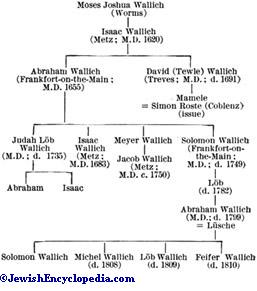Wallich
 From Jewish Encyclopedia (1906)
From Jewish Encyclopedia (1906) Wallich:
German family which probably derived its name from the Hebrew transcription of "Falk" (
 ). The earliest known members of it are Joseph b. Meïr Wallich, a physician, and Moses Joshua Wallich, both of whom lived at Worms in the sixteenth century. A document relating to the purchase by Joseph b. Meïr Wallich of a Rashi and Rashbam manuscript (Worms, 1615) is signed by Joseph and by his two sons Eliezer and Solomon, all physicians and all surnamed Weibush (Phoebus?), and by thirteen other members of the Wallich family, among them the physicians Moses b. Lezer and Moses b. Moses Joshua (surnamed Weibelin). Many physicians of the Wallich family were prominent in Germany in the eighteenth century.
). The earliest known members of it are Joseph b. Meïr Wallich, a physician, and Moses Joshua Wallich, both of whom lived at Worms in the sixteenth century. A document relating to the purchase by Joseph b. Meïr Wallich of a Rashi and Rashbam manuscript (Worms, 1615) is signed by Joseph and by his two sons Eliezer and Solomon, all physicians and all surnamed Weibush (Phoebus?), and by thirteen other members of the Wallich family, among them the physicians Moses b. Lezer and Moses b. Moses Joshua (surnamed Weibelin). Many physicians of the Wallich family were prominent in Germany in the eighteenth century.
Subjoined is an abbreviated pedigree:

- H. Schultze, Gesch. der Familie Wallich;
- Monatsschrift, 1905, passim.
The following are the more important members:
Abraham ben Isaac Wallich:Physician; born at Metz; flourished at Frankfort-on-the-Main in the second half of the seventeenth century. He went to Padua to study medicine, obtaining his diploma, "maxima cum laude," in 1655; and in 1657 he went to Frankfort to practise as a physician. He was the author of a Hebrew treatise on medicine entitled "Sefer Refu'ot," or, as he called it in Latin, "Harmonia Wallichis Medica" (published posthumously, Frankfort-on-the-Main, 1700). He tried to prove that the ailments of the soul correspond to those of the body and that they must be treated in the same way. In this work he speaks alternately as a physician and as a preacher of morals.
Immanuel Wallich:Rabbi and physician of Coblenz in the eighteenth century.
Joseph b. Meïr Wallich:Physician; the earliest known member of the family; flourished at Worms in the sixteenth and seventeenth centuries. He is known to have written in 1597, on a manuscript of Isaac Israeli's translation of Ibn al-Yazzar's "Zad al-Musafir," a bibliographical note in which he confounded the translator with Isaac ben Joseph Israeli. From this and from what has been said above it may be concluded that Joseph b. Meïr was a collector of medical and rabbinical manuscripts. He had in his possession also a copy of Bernard de Gordon's "Sefer ha-Gebulim" (see Neubauer, "Cat. Bodl. Hebr. MSS." No. 2125, 4), the first leaf of which was supplied in his own handwriting.
Judah ben Abraham Wallich:Physician; lived at Frankfort-on-the-Main in the seventeenth and eighteenth centuries. He was the author of: (1) "Dimyon ha-Refu'ot" or "Harmonia Wallichis Medica Animæ et Corporis" (Frankfort-on-the-Main, 1700), a Judæo-German compendium of his father's "Sefer Refu'ot," supplemented by a treatise on fever in children. (2) "Ẓori ha-Shamayemah" (Latin title, "Theriaca Cœlestis Wallichiana"; German, "Himmlischer Theriak"; ib. 1713). Of this work only the German preface and the first Hebrew section are extant; the remainder, which was destroyed by fire, was not published. (3) "Dankfest" ( ib. 1716), a thanksgiving memorial in pure German with Hebrew characters; written on the occasion of the birth of Archduke Leopold of Austria (April 13, 1716).
Moses b. Eliezer Wallich:Scholar; lived at Worms in the seventeenth century. He was the author of "Sefer Meshalim" or "Kuh-Buch" (Frankfort-on-the-Main, 1687), a German collection of fables adapted from Berechiah ha-Naḳdan's "Mishle Shu'alim" and Isaac ibn Sahulah's "Mashal ha-Ḳadmoni." This book is not to be confounded with a similar work by Abraham B. Mattathias which bears the same title.
Naphtali Hirz b. Abraham Wallich:Physician; lived at Metz in the seventeenth century; brother of Judah ben Abraham Wallich. He is known as having been the competitor of Solomon b. Baruch of Lippstadt, who was appointed physician to the Jewish community of Metz. Solomon delayed his arrival, and consequently the community appointed Naphtali Hirz in his stead. When Solomon reached Metz a quarrel arose between the two physicians, Solomon urging his letter of appointment, and Naphtali Hirz his priority. They continued quarreling until 1695, when they were reconciled by R. Gabriel Eskeles of Metz.
Solomon Wallich:Physician of Mayence, where he died May 11, 1780; son of Immanuel Wallich. Like his father, Solomon received a rabbinical education in addition to his medical training.
- A. Berliner, in Hebr. Bibl. vii. 82-83;
- Carmoly, Histoire des Médecins Juifs, pp. 200, 207;
- Fürst, Bibl. Jud. iii. 492;
- Steinschneider, Cat. Bodl. cols. 1377-1378, 2008;
- idem, Hebr. Uebers. pp. 704, 959;
- Horovitz, Jüdische Aerzte, pp. 30-32;
- Landau, Gesch. der Jüdischen Aerzte, p. 116.
Categories: [Jewish encyclopedia 1906]
↧ Download as ZWI file | Last modified: 09/04/2022 16:34:09 | 14 views
☰ Source: https://www.jewishencyclopedia.com/articles/11161-moses-wallich.html | License: Public domain
 ZWI signed:
ZWI signed: KSF
KSF